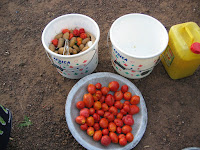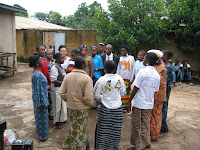Here is a photo journal of what has happened in the last 3 months at my village.
- finished teaching all my classes, and gave final exams;
- helped my 10th graders to review for their upcoming national exam to enter into high school;
- found a new library director to replace me;
- introduced adults and students on the concept of computer and gave some mini training in Word;
- spent as much time as I could with people that I am close to;
- ate a lot of juicy and yummy mangos;
- listened for the very last time, heavy rain beating down on my thatched roof;
- visited for the last time, students who live very far away;
- gave away a lot of school supplies to good students;
- distributed other belongs among people that I am close to;
- made a sacrifice (see photos below);
- played in farewell soccer match;
- and said goodbye to my village
March: 
A meeting with all the "white collar" workers of the village to talk about the importance of keeping the library open after I leave, critics and suggestions to make the library function better, "unveiling" of the computer, and call for candidates for the library director position
 April - May:
April - May: Training students on using computer. Kids and adults alike think computer is some kind of amazing sorcier

 April:
April: Close of Service (COS) conference in April, a day at the beach Casa near Conakry
 April - present:
April - present: The best season of the year,
mango season. They come in all different shapes, sizes, and colors, with different taste, all very YUMMY!
 May: School is coming to an end
May: School is coming to an end, and my time here is once again up. My students profit to snap some pictures with me.
 June 1:
June 1: To thank the village, I decided to follow their muslim tradition and do a
sacrifice, kill a mouton, and make a lot of food to offer to people. Here is what I bought to hopefully feed 150-200 ppl (of course people don't come to eat to fill themselves up):
1 bag of 50 kg of rice
10 L of peanut oil
3 kg of potatos
lots of eggplants, tomatos, onions, hot pepper and spices(most things here aren't sold by weight)
1 goat offered to me by my host mom
(estimated cost in franc guinean 400 000 + 200 000 for the goat, equivalent of around $135)
My "papa", the butcher,
and the scrificial lamb

Step 1: hold the

mouton down
Step 2: bring the knife to the throat

Step 3:

slit the throat of the mouton
Tomatos and potatos, 10 L of peanut oil
that will go into the sauc

e

One 50kg bag of rice, got to pick out those little
rocks, wouldn't want to get sued for broken teeth
The senior cooking team

The junior sous-chefs

Let's turn that big 'o pot of rice
(half of the bag is in this huge marmite)

The pot where we cook the sauce for the rice,
all the chopped up eggplants are in the bowl at the bottom left

All the firewood that my students
helped to bring for this sacrifice


Cooked rice are put in large bowls (feed about 10 people), sauces for the rice are in the smaller bowls. We made about 20 bowls of rice and sauce each.
Can't do a sacrifice without having people come to read some verse in the Koran. Each kernel of corn represent the verse that each person have read, and my host mom passed them onto me afterwards.

Hangint out with students at the sacrifice (well, more like the
"party" after the sacrifice)



what is a party without some dancing,
well you can't relly see the movement or hear the music,
but we were dancing, well, more like swinging left and right

A good opportunity to snap some pictures with my guests
 June 7: The day before I left my village for good
June 7: The day before I left my village for good, the village organized 2
soccer matches, one girls' match,

one match between boys and all the civil servants (mostly teachers, mostly males)

I played for about 5 minutes on the adult team against the boys. They never passed me the ball, but I made enough people laugh, so it is all good.


One last visit to students in the far away villages
June 8: the day I left my village for good
Family photos!
Host mom, dad, their 2 daughters, 2 sons, and grandchildren
(of the course the actually family is much larger than this,
but other members aren't around)




The library management team, the new director-Oumar Baldé is in the green shirt on the left in the picture

A
new beginning awaits me, another layer of life to be experienced, a new chapter with all its mystery and uncertainty, but undoubtly exciting and rewarding! I am not done with my changes!



Photos taken at city of Dalaba, early morning.









































